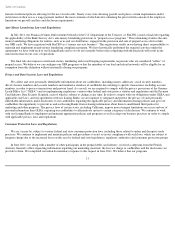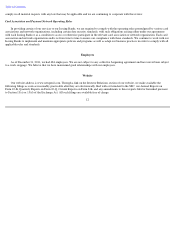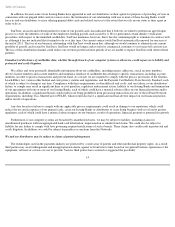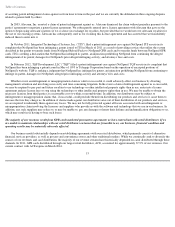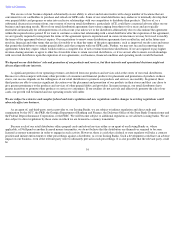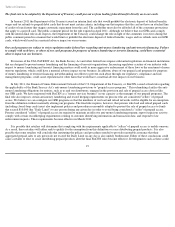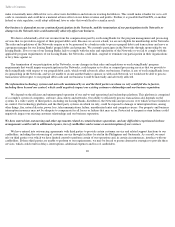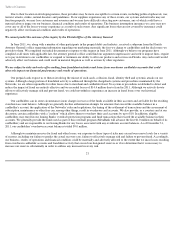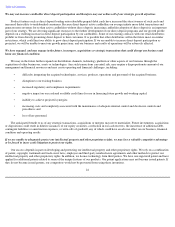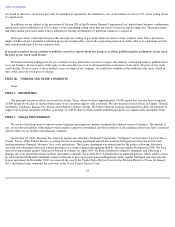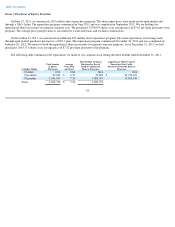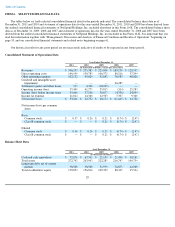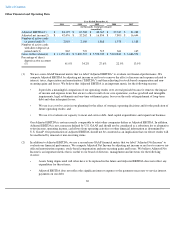NetSpend 2011 Annual Report Download - page 25
Download and view the complete annual report
Please find page 25 of the 2011 NetSpend annual report below. You can navigate through the pages in the report by either clicking on the pages listed below, or by using the keyword search tool below to find specific information within the annual report.
Table of Contents
Due to their location in developing nations, these providers may be more susceptible to certain events, including political upheavals, war,
terrorist attacks, strikes, natural disasters and pandemics. If our suppliers experience any of these events, our systems and networks may not
function properly, we may lose customers and revenues and we may have difficulty attracting new customers, any of which could have a
material adverse impact on our business, financial condition and results of operations. The business interruption insurance we carry may not
cover any or all of the losses we may experience as a result of such events. Any significant losses that are not covered by insurance could
negatively affect our financial condition and results of operations.
We cannot predict the outcome of the inquiry by the Florida Office of the Attorney General.
In June 2011, we, along with a number of other participants in the prepaid debit card industry, received a subpoena from the Florida
Attorney General's office requesting information regarding our marketing materials, the fees we charge to cardholders and the disclosures we
provide to them. We completed our initial documentary response to this request in June 2011. Although we believe our programs have
complied at all times with applicable law, the attorney general's office could find our arguments unpersuasive and seek to impose fines, require
us to pay restitution to our cardholders or suspend or terminate our ability to offer our products and services in Florida. Any such result would
adversely affect our business and could result in material litigation as well as actions by other regulators.
We are subject to risks and write-offs resulting from fraudulent activities and losses from overdrawn cardholder accounts that could
adversely impact our financial performance and results of operations.
Our prepaid cards expose us to threats involving the misuse of such cards, collusion, fraud, identity theft and systemic attacks on our
systems. Although a large portion of fraudulent activity is addressed through the chargeback systems and procedures maintained by the
Networks, we are often responsible for other losses due to merchant and cardholder fraud. No system or procedures established to detect and
reduce the impact of fraud are entirely effective and we recorded losses of $14.4 million due to fraud in 2011. Although we actively devote
efforts to effectively manage risk and prevent fraud, we could nevertheless experience an increase in fraud losses over our historical
experience.
Our cardholders can in some circumstances incur charges in excess of the funds available in their accounts and are liable for the resulting
overdrawn account balance. Although we generally decline authorization attempts for amounts that exceed the available balance in a
cardholder's account, the application of the Networks' rules and regulations, the timing of the settlement of transactions and the assessment of
subscription, maintenance or other fees can, among other things, result in overdrawn card accounts. We also provide, as a courtesy and at our
discretion, certain cardholders with a "cushion" which allows them to overdraw their card accounts by up to $10. In addition, eligible
cardholders may enroll in our Issuing Banks' overdraft protection programs and fund transactions that exceed the available balance in their
accounts. We generally provide the funds used as part of this overdraft program (MetaBank will advance the first $1.0 million on behalf of its
cardholders) and are responsible to our Issuing Banks for any losses associated with any overdrawn account balances. As of December 31,
2011, our cardholders' overdrawn account balances totaled $9.0 million.
Although we maintain reserves for fraud and other losses, our exposure to these types of risks may exceed our reserve levels for a variety
of reasons, including our failure to predict the actual recovery rate, failure to effectively manage risk and failure to prevent fraud. Accordingly,
our business, results of operations and financial condition could be materially and adversely affected to the extent that we incur losses resulting
from overdrawn cardholder accounts and fraudulent activity that exceed our designated reserves or if we determine that it is necessary to
increase our reserves substantially in order to address any increased recovery risk.
21


